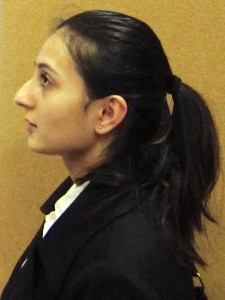 CSEE graduate student Asmita Korde will present a paper on her research with Professor Tinoosh Mohsenin tomorrow at the the SPIE Defense Security and Sensing Conference in the Baltimore Convention Center. Asmita was a UMBC CWIT Scholar and received a BS degree in Computer Engineering in 2011. She is now finishing her MS degree at UMBC in the Electrical Engineering program.
CSEE graduate student Asmita Korde will present a paper on her research with Professor Tinoosh Mohsenin tomorrow at the the SPIE Defense Security and Sensing Conference in the Baltimore Convention Center. Asmita was a UMBC CWIT Scholar and received a BS degree in Computer Engineering in 2011. She is now finishing her MS degree at UMBC in the Electrical Engineering program.
Her paper, Detection Performance of Radar Compressive Sensing in Noisy Environments, describes research done in collaboration with her mentor, Tinoosh Mohsenin, and Damon Bradley of the NASA Goddard Space Flight Center.
Here is the abstract.
In this paper, radar detection via compressive sensing is explored. Compressive sensing is a new theory of sampling which allows the reconstruction of a sparse signal by sampling at a much lower rate than the Nyquist rate. By using this technique in radar, the use of matched filter can be eliminated and high rate sampling can be replaced with low rate sampling. In this paper, compressive sensing is analyzed by applying varying factors such as noise and different measurement matrices. Different reconstruction algorithms are compared by generating ROC curves to determine their detection performance. We conduct simulations for a 64-length signal with 3 targets to determine the effectiveness of each algorithm in varying SNR. We also propose a simplified version of Orthogonal Matching Pursuit (OMP). Through numerous simulations, we _nd that a simplified version of Orthogonal Matching Pursuit (OMP), can give better results than the original OMP in noisy environments when sparsity is highly over estimated, but does not work as well for low noise environments.